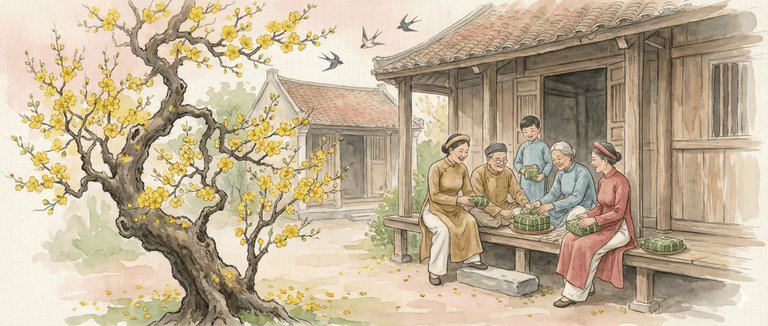
Vietnamese Customs - The Ethnic Identity Through Millennia
Vietnamese Customs
The Ethnic Identity Through Millennia of History
Ancestor worship
Traditional festivals
Folk culture
Ancestor Worship - The Spiritual Foundation of Vietnamese People
Ancestor worship is one of the most distinctive and enduring cultural features of the Vietnamese people. This is not merely a religious ritual but also an expression of gratitude and respect for the deceased, while serving as a bond connecting generations within the family.
The Meaning of Ancestor Worship
Ancestor worship in Vietnamese culture carries profound meanings:
- Preserving family traditions: Maintaining family lineage and traditional values through generations
- Expressing filial piety: The principle of “remembering the source when drinking water” is clearly demonstrated
- Spiritual connection: Creating bonds between the living and the deceased
- Moral education: Transmitting moral values to descendants
Forms of Ancestor Worship
Family Ancestral Altar
The family ancestral altar is usually placed in the most solemn position in the house, demonstrating respect:
Characteristics of family ancestral altars
- Placed in a high, clean, and well-ventilated location
- Arranged with worship items such as incense, lamps, flowers, and betel nuts
- Contains photos or memorial tablets of ancestors
- Always kept clean and well-maintained
Daily Worship Rituals
Daily worship rituals are usually simple but carry deep meaning:
- Morning worship: Usually in the early morning, offering incense and lighting lamps
- Evening worship: In the afternoon, offering rice, water, and fruits
- Worship on full moon and new moon days: More solemn with a full offering tray
Traditional Festivals - The Cultural Identity of the Ethnic Group
Traditional festivals are an indispensable part of the spiritual life of the Vietnamese people. Each region has its distinctive festivals, reflecting unique cultural characteristics.
Notable Festivals
Lunar New Year (Tet)
Lunar New Year (Tet Nguyen Dan) is the biggest festival of the year for Vietnamese people:
Customs during Tet
- Worship of Kitchen Gods (23rd day of the 12th lunar month)
- Cleaning the house and buying new items
- Making Chung cakes and Tet cakes
- First-foot ceremony at the beginning of the year
- Tet greetings and giving lucky money
- New Year’s Eve worship
Mid-Autumn Festival
Mid-Autumn Festival (Children’s Festival) with colorful lantern displays:
- Lantern parade: Children carrying lanterns parading through streets
- Lion dance: Lion dance performances celebrating the bright moon
- Eating mooncakes: Enjoying baked and soft mooncakes
Culinary Culture During Festivals
Culinary culture in Vietnamese customs is not merely a lifestyle need but also carries deep spiritual significance.
Chung Cakes and Tet Cakes
Chung cakes and Tet cakes are symbols of heaven and earth in Vietnamese culture:
- Chung cake: Square shape symbolizing the earth
- Tet cake: Round and long shape symbolizing the sky
Foods in Worship Rituals
Essential items in worship trays
- Betel nuts - symbol of marital harmony
- Fruits - expressing sincerity
- Wine and tea - to invite ancestors to partake
- Rice and soup - essential items in daily life
Customs in Daily Life
Many customs in the daily life of Vietnamese people are deeply rooted in ethnic identity:
Family Customs
- Respecting elders: Always greeting and yielding to elders
- Eating etiquette: Not sticking chopsticks in rice, not flipping over food
- Polite comings and goings: Asking permission when leaving and entering the house, greeting elders
Social Customs
- Gifts when visiting others: Bringing gifts and fruits when visiting homes
- Forms of address: Using terms like “grandchild”, “uncle”, “aunt” according to relationships
- Community participation: Helping each other in important tasks
Preserving and Promoting Vietnamese Custom Values
In the modern era, preserving and promoting traditional custom values is very important:
Values Worth Preserving
- Filial piety towards parents and grandparents
- Spirit of mutual support in the community
- Respect for traditional values
- Love for homeland and country
Ways to Transmit to Younger Generations
- Family education: Parents setting examples for children
- School education: Integrating traditional culture into the curriculum
- Promotion through cultural activities: Organizing festivals and community activities
Conclusion
Vietnamese customs are an inseparable part of the spiritual life of the people. These traditional values not only enrich cultural life but also help preserve ethnic identity through historical ups and downs. Inheriting and promoting these good values is how we express gratitude to our ancestors and our responsibility to future generations.
”A nation that cannot preserve its traditional values cannot have a future.”
- Ho Chi Minh -